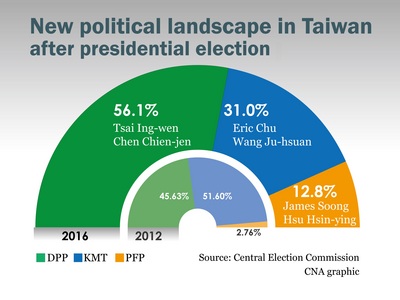-
Tips for becoming a good boxer - November 6, 2020
-
7 expert tips for making your hens night a memorable one - November 6, 2020
-
5 reasons to host your Christmas party on a cruise boat - November 6, 2020
-
What to do when you’re charged with a crime - November 6, 2020
-
Should you get one or multiple dogs? Here’s all you need to know - November 3, 2020
-
A Guide: How to Build Your Very Own Magic Mirror - February 14, 2019
-
Our Top Inspirational Baseball Stars - November 24, 2018
-
Five Tech Tools That Will Help You Turn Your Blog into a Business - November 24, 2018
-
How to Indulge on Vacation without Expanding Your Waist - November 9, 2018
-
5 Strategies for Businesses to Appeal to Today’s Increasingly Mobile-Crazed Customers - November 9, 2018
Taiwan elects first female president
Taiwan has elected its first woman President, Ms Tsai Ing-wen, who swept to victory with a commanding lead – one that strengthens her hand in the island’s polarised politics, but also raises expectations of what she can achieve.
Advertisement
The overwhelming victory for the leader of the pro-independence Democratic Progressive Party looks set to usher in a new round of uncertainty with the self-ruled island’s giant neighbour China, which still claims Taiwan as its territory to be taken by force if necessary.
Meanwhile, her rival Eric Chu of the Kuomintang party, conceded defeat at 7pm, just three hours after polls closed.
“We hope and believe that the global community will adhere to the one-China principle, oppose “Taiwan independence” in any form and support peaceful development of cross-Strait relations through concrete actions”, Foreign Ministry spokesperson Hong Lei said in response to questions on Taiwan-related diplomatic situation in the future.
Beijing has warned repeatedly in the run-up to the elections that hard-earned peace across the Taiwan Strait could be affected by a Tsai win.
“I have promised on many occasions that I will build a consistent, predictable and sustainable cross-strait relationship”, she said.
Tsai will be Taiwan’s first female president and only the second DPP president, following Chen Shui-bian’s 2000-2008 tenure.
The current ruling party KMT is conservative and pro-Bejing.
Yet despite more than 20 deals and a tourist boom, closer ties have exacerbated fears that China is eroding Taiwan’s sovereignty by making it economically dependent.
Fireworks reigned above jubilant crowds at the DPP headquarters, while tears flowed at KMT as Mr Chu bowed and apologised to his supporters. He immediately resigned as chairman of the KMT. So she’ll bring a different perspective, different ideas.
“I’m very happy with the results”, said Soda Su, 40, a web designer.
Last year, United States singer-songwriter Katy Perry caused a stir in both Taiwan and China when she appeared on stage draped in a Taiwanese flag at a concert in Taipei, while donning a glittering gold dress adorned with sunflowers – the symbol of anti-China student protests in Taiwan in 2014.
Though her agency, JYP Entertainment, has apologized twice stressing that she did not have any political intentions, the case has infuriated Chinese citizens, with some Chinese TV stations canceling schedules for not only TWICE but other JYP artists.
Advertisement
One analyst said the drama could boost election turnout.





























